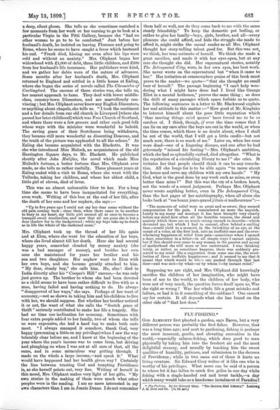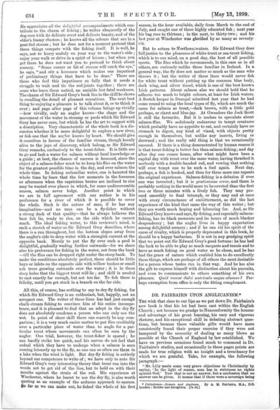FLY-FISHING.* GOD ALMIGHTY first planted a garden, says Bacon, but
a very different person was probably the first fisher. However, that was a long time ago; and next to gardening, fishing is perhaps the most innocent, gentle, and elevating recreation in the world,—especially salmon-fishing, which does good to man physically by taking him into the freshest air and the most delightful scenery, and morally by teaching him the sweet qualities of humility, patience, and submission to the decrees of Providence ; while in two cases out of three it hurts no living creature. Sir Edward Grey writes of it like one who is worthy of his privileges. What more can be said of a person to whose lot it has fallen to catch five grilse in one day while fishing with a single-handed rod and trout tackle,—a day which many would take as a handsome instalment of Paradise • Ply-Fishing. By Sir Edward Grey. "The Haddon Hall Library." London J. M Dent and Co. [7e. 6d. set.] He appreciates all the delightful accompaniments which con- tribute to the charm of fishing ; he writes eloquently of the dog-rose with its delicate scent and delicate beauty, and of the elder's foamy clusters ; he knows all the colours that are in a peat-fed stream ; but he does not for a moment pretend that these things compete with the fishing itself. It is well, he says, not to hurry unduly on your way to the water's side ; enjoy your walk or drive in a spirit of leisure ; but when you get there he does not want you to pretend to think about scenery. " Some corner or bit of stream will catch the eye," he says, " and stir a keenness which makes one impatient of preliminary things that have to be done." There are those who feel this impatience so fully that it needs a struggle to wait and tie the rod-joints together ; there are some who leave them untied, an amiable but fatal weakness. The charm of Sir Edward Grey's book lies in the skill he shows in recalling the detail of pleasant sensations. The next best thing to enjoying a pleasure is to talk about it, or to think it over ; and page after page of this volume brings up vividly —how vividly, only an angler knows—the shape and the movement of the water in streams or pools which Sir Edward Grey has never seen, but which he has the art to suggest with a description. Very characteristic of the whole book is a dis- cussion whether it be more delightful to explore a new river, or fish one that the angler knows by heart. We should give it ourselves in favour of the familiar stream, though keenly alive to the joys of discovery, which belong, as Sir Edward Grey remarks, exclusively to the trout-fisher. It is little use to go and lash a water for salmon without local knowledge or a guide ; at best, the chance of success is lessened, since the object of a salmon-fisher must be to keep his flies on the water for the greatest possible time in the day, and over salmon the whole time. In fishing unfamiliar water, one is haunted the whole time by fears that the few moments in the forenoon or afternoon when the capricious brutes are inclined to rise may be wasted over places in which, for some undiscoverable reason, salmon never lodge. Another point in which we are in full agreement with our author is in his preference for a river of which it is possible to cover the whole. Such is the nature of man, if he has any imagination—and no man can be a fly-fisher without a strong dash of that quality—that he always believes the best fish lie, ready to rise, on the side which he cannot reach. The ideal fishing water, to this reviewer's mind, is such a stretch of water as Sir Edward Grey describes, where there is a run throughout, but the bottom slopes away from the angler's side to deep water with a strongish current at the opposite bank. Merely to put the fly over such a pool is delightful, gradually wading further outwards—for we share also his preference for fishing in the water, not from the bank —till the flies can be dropped right under the steep bank. To make the conditions absolutely perfect, there should be little bays or inlets on the opposite side with willow bushes or small ash trees growing outwards over the water ; it is in these deep holes that the biggest trout will lie ; and skill is needed to cast exactly far enough, but not too far. To fish these is felicity, until you get stuck in a branch on the far side.
All this, of course, has nothing to say to dry-fly fishing, for which Sir Edward Grey is an enthusiast, but, happily, not an arrogant one. The writer of these lines has had just enough chalk-stream fishing to convince him of his entire incompe- tence, and it is pleasant to find that an adept in the dry fly does not absolutely condemn a person who can only use the wet. In point of sheer skill there can scarcely be any com- pariion ; it is a very much easier matter to put flies creditably over a particular piece of water than to angle for a par- ticular trout whose movements can often be seen by the angler. One trial, however, the trout-fisher is spared ; he can hardly strike too quick, and his nerves do not feel that ordeal which they have to undergo when a salmon is seen coming leisurely up to the fly, as one can so often see them in a lake when the wind is light. But dry-fly fishing is entirely beyond our competence to write of ; we have only to note Sir Edward Grey's very interesting theory that trout run into the weeds not to get rid of the line, but to hold on with their mouths against the strain of the rod. His experience at Winchester, where he learnt to use the dry fly, is also worth quoting as an example of the arduous approach to success. to far as we can make out, he fished the whole of his first season, in the hour available, daily from March to the end of, July, and caught one of these highly educated fish ; next year his bag rose to thirteen ; in the next, to thirty-two ; and his last year at Winchester was glorified by as many as seventy- six.
But to return to Northern !waters. Sir Edward Grey does full justice to the pleasures of white-trout or sea-trout fishing, which is to our mind, on a good day, the best of all possible sports. The flies which he recommends, in this case as in all others, are curiously unlike those familiar in Ireland. In a general way, the fly does not matter so much as the man who throws it ; but the writer of these lines would never fish for white trout without putting up the common blue body, dark wing, and silver tinsel, which is one of the best known Irish patterns. About salmon also we should hold that he adheres too much to bright colours, at least for Irish waters. A Scotch keeper in Donegal admitted last year that he had come round to using the local types of fly, which are much the same for salmon as trout,—dark brown, with a little gold perhaps, or claret and blue-jay. At Gweedore the Jock Scott is still the favourite. But it is useless to speculate about salmon-flies. We sedulously endeavour to tempt creatures which probably have no appetite to eat, and certainly have no stomach to digest, any kind of viand, with objects pretty enough in themselves, but unlike any insects, living or drowned ; and the really odd thing is that we occasionally succeed. If there is a thing demonstrated by human reason it is that trout-fishing is better fun than salmon-fishing; and day • after day one comes home, after what might have been a capital day with trout over the same water, having thrashed it uselessly with a double-handed rod, and vowing that nothing will ever tempt one to be such a fool again. Next day, perhaps, a fish is hooked, and then for three more one repeats the original experience. Salmon-fishing is a delusion if ever one was invented ; but it is gratissimus error, and there is probably nothing in the world more to be coveted than the first two or three minutes with a lively fish. , They may pro- ceed smoothly to final triumph, or they may end at once with every circumstance of embitterment, as did the last experience of the kind that came the way of this writer ; but they are worth much hoping and labouring for. And, as Sir Edward Grey knows and says, fly-fishing, and especially salmon- fishing, has its black moments and its hours of much blacker despondency ; but the angler lives in happy expectation among delightful scenery ; and if he can rid his spirit of the curse of rivalry, which is properly deprecated in this book, he should be a happy barbarian. It is not in any grudging spirit that we point out Sir Edward Grey's good fortune: he has had the luck to be able to play as much racquets and tennis and to have as much fishing on good water as he chose, and he has had the grace of nature which enabled him to do excellently these things, which are perhaps of all others the most desirable for a person whose tastes run in that way. And he has also the gift to express himself with distinction about his pursuits, and even to communicate to others something of his own pleasure. Quid voveat dulci nutricula majus alumno ? Per- haps exemption from office is only the fitting complement.







































 Previous page
Previous page